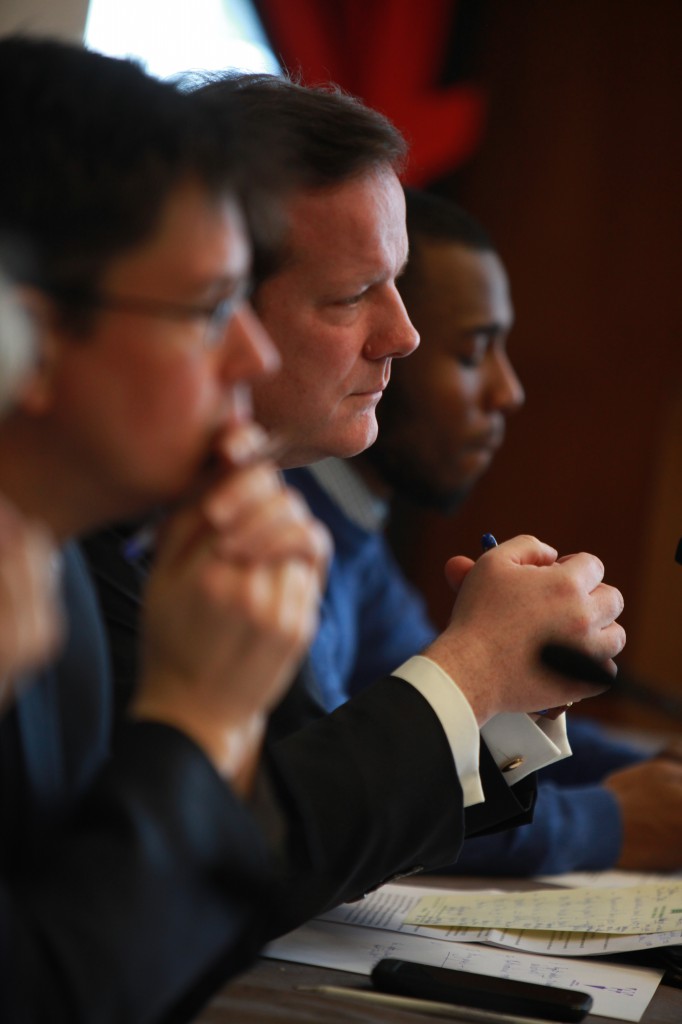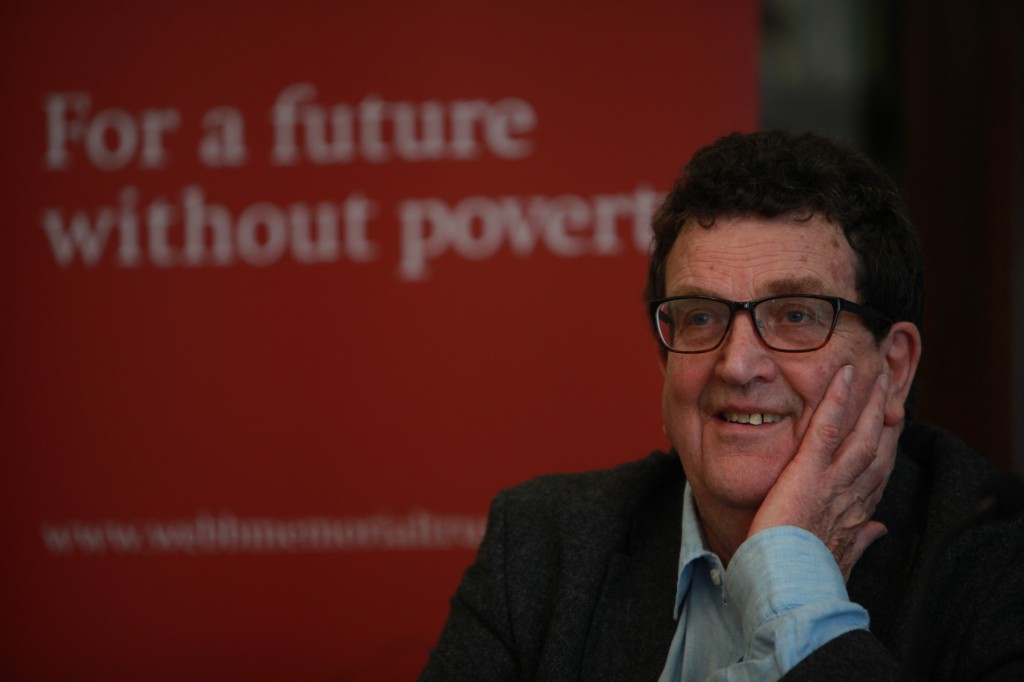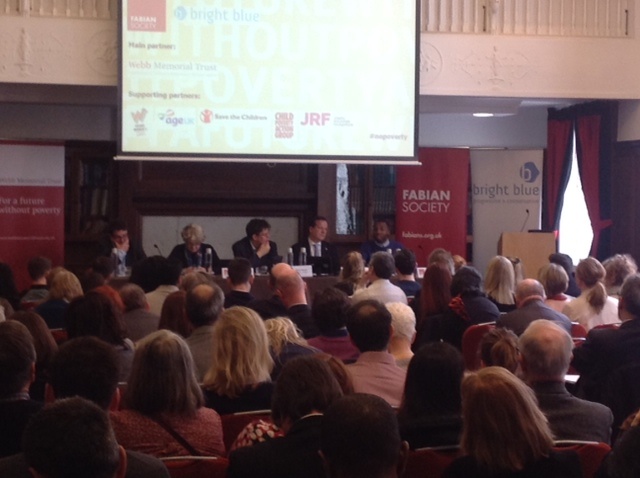A Future Without Poverty – Panel Discussion Summary
Posted on 24 Mar 2015 Categories: Blog, Events, Event reports
by Georgia Smith
Panel Discussion: A future without poverty
Chair: Oliver Wright, Whitehall correspondent, the Independent
- Charlie Elphicke MP, PPS to secretary of state for work and pensions
- Helen Goodman MP, shadow minister for welfare reform
- Kenny Imafidon, political commentator
- Barry Knight, principal adviser, Webb Memorial Trust
Charlie Elphicke noted two experiments in combating poverty, one through tax credits and the spending of public money, the other through welfare reforms and encouraging work. He said that under the present administration, there were two million more people in work, most of them in ‘good quality’ jobs and that youth unemployment had fallen by 200,000 in the last year. However, he added, more can be done. Aspiration, or the lack of it, was an important element of poverty, and the provision of skills, of education and chances in life were crucial. More would be done, he said, under the head of skills training and education in the next parliament.
From the other end of the political spectrum, Helen Goodman said that the number of children in relative poverty had fallen between 1995 and 2010 and had continued to fall under the Coalition. But, she said, absolute poverty had increased, food bank use had risen and the general sense was of more, not less, poverty. This was because of the new prevalence of in-work poverty – where people had jobs but still could not afford to make ends meet. Her solution: abolish the bedroom tax, raise the minimum wage, crack down on zero hours contracts, increase the amount off free childcare, and exercise closer controls over the energy market and rental sector, both of which made away with a significant amount of the wages of the working poor. It was clear, too, she said that the voluntary sector should be one of the partners in attacking poverty. Politicians needed to listen to them and to provide stable funding.
Kenny Imafidon, spoke of the relationship between poverty and the formation of gangs. He grew up in Peckham ‘on the estate’ because his mother was too busy trying to make ends meet. His experience suggested a clear link – where people were poor and uneducated, they were more likely to turn to violent crime which, for young people often meant gangs. You have to be blunt, he said – money is needed. Benefits cuts were damaging, but education and aspiration were big things, too. Even if you have money, managing it is difficult without education and aspirations needed to be encouraged by making people understand that they don’t need to be trapped in unacceptable circumstances.
The key issue, said Barry Knight, was emotional damage. Those who came from poor backgrounds, as he had done, still felt this even at a long distance of time. Debates about poverty started in the wrong place, so they ended in the wrong place, he believed. Don’t look at the problem, he said, look at the solution. We need to start from the position of the society we want. Current thinking didn’t do this: the research industry produced much analysis but had little to say about the solutions. Similarly, neither of the main political parties was anywhere near a solution, and so long as they remained obsessed with economics, they would come up with the wrong answers. We need to look more at the community, at social and environmental considerations. Webb’s research through YouGov suggested that what people wanted was a ‘fair’ society and one in which ‘relationships’ and ‘security’ mattered more than material goods. Taking up this point, one speaker from the floor bemoaned the loss of solidarity and sense of community. Not everyone could have aspirations, she said). As Young Voices had shown, children had a way of cutting to the heart of the problem and, in his view, adults needed training in how to listen to children.
He cited Ralf Dahrendorf’s noting of three global trends. Freedom was increasing, prosperity was increasing, but solidarity was decreasing and that’s what people wanted. How could we find it under new economic conditions?
Youth unemployment
The idea was mooted of taxing bankers’ bonuses in order to fund jobs for young people – so long, noted Kenny Imafidon, as they were good jobs – or top up welfare payments. Charlie Elphicke pointed out that there had been a strong move forward on youth employment under the present government, though Helen Goodman remarked there were still three-quarters of a million of young unemployed.
Poverty of aspiration
How would they find work, wondered one questioner, if they had no education and no aspiration? She had witnessed another crippling form of poverty, the poverty of aspiration. How was this to be dealt with? Charlie Elphicke noted that it was not always a matter of moving people between different ‘ladders’ of aspiration, but from one rung to the next of the same ladder (not from ladder 1 to ladder 100, but from rung 7 to rung 10 on the same ladder, as he put it). Barry Knight agreed that it was critical to the social structure that you give people the opportunity to make progress.
Disengagement of young people
Another result of the growth of inequality and the fragmentation of society was that people, especially young people had disengaged from political and social concern. There was both cause and effect operating here. Politicians didn’t take notice of young people’s concern, so they didn’t vote. Because they didn’t vote, politicians didn’t take notice of their concerns because there was no backlash. That was why pensioners did better than young people when it came to claiming politicians’ attention. What could be done about this? Charlie Elphicke suggested looking at the property market. Owner-occupation among young people was falling, but it was an important way of making people feel they had a stake in society. On this head, a member of the audience raised the issue of second homes. If these were to be taxed at a punitive rate, he suggested, it would both discourage their acquisition and cause existing second-home owners to sell them, so releasing more property for buyers. There were fewer working class MPs, said Kenny Imafidon and so fewer with experience of poverty which worsened the communications gap between politicians and young people. He suggested teaching politics in school and looking for ways to make it fun, rather than arid and remote.
One person, however, felt that young people’s disengagement was overstated. In his work for social enterprise incubator, UnLtd, he had found that, of the young people he worked with, 47 per cent wanted to start a business and, so far from being alienated from social concerns, 27 per cent of them wanted to start a social enterprise.
Posted on 24 Mar 2015 Categories: Blog, Events, Event reports


